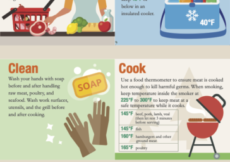Here’s what you need to know about the risks preemies face in the NICU, how they’re treated, and when they might turn into longer-term problems.
Chase and Lily’s lives got off to a bit of a rocky start after their mom, Devon MacDonald, went into labour with them when she was 30 weeks and four days pregnant. “Both had to be resuscitated, and then they were intubated,” recalls MacDonald. The next few weeks were a roller coaster, as one issue after another plagued the fraternal twins. “When Lily started doing better after 10 days, Chase started not doing well,” she says.
When a baby is born early, his bodily systems are immature, and he’s exposed to things that he wouldn’t be in utero, putting him at risk for a number of health issues. But, says Eugene Ng, a neonatologist and chief of newborn and developmental paediatrics at Toronto’s Sunnybrook Health Sciences Centre, “prematurity is a big spectrum.” Ng explains that babies born as early as around 23 weeks can survive, but babies born before 37 weeks are considered premature. “The likelihood and severity of any complication would decrease as the baby is born more and more maturely,” Ng adds.
Here are five of the most common problems that can arise in the neonatal intensive care unit (NICU) and beyond:
Breathing support
“Lung issues are the first, immediate thing we will see from the time of birth,” says Ng. When a baby is born early, especially before 30 weeks’ gestation, his lungs might not be ready to breathe on their own. Doctors have two ways of dealing with this: one is by intubating them, which involves putting a tube down the throat and into the airway, for full breathing support. The other method is a CPAP device (which stands for continuous positive airway pressure), which is commonly used for adults with sleep apnea. This device doesn’t go down the throat, but rather sits on the nose. “More and more we are pushing for the smaller babies to receive this non-invasive support from the beginning because it’s less injurious to the lungs,” explains Ng.
Some premature babies may go on to develop chronic lung disease, also sometimes called bronchopulmonary dysplasia (BPD), and 16 percent still require oxygen at discharge, which they will be weaned off of over a few months. These babies are more prone to respiratory infections and bronchiolitis. “The lungs take time to heal and grow,” says Ng. “Just because they no longer need oxygen or mechanical breathing support doesn’t mean their lungs are completely healed.”
Feeding issues
Generally speaking, preemies have very slow-moving guts and are prone to vomiting. One of the things that will be monitored closely in the NICU is your baby’s feeding and growth.
A much more serious issue that doctors will watch for is necrotizing enterocolitis (NEC), a disease where the thin bowel of a preemie begins to break down and bacteria cross it, which could lead to the death of an infant or the removal of part of the bowel, explains Michael Narvey, head of neonatology for Winnipeg Regional Neonatal Program, who works primarily at the Children’s Hospital in Winnipeg. In his unit, babies born younger than 29 weeks or under 1,250 grams are fed very small amounts every few hours to “prime their immature guts,” which reduces that chance of NEC. Drinking breastmilk, whether from the mother or a donor, also reducing the chances of NEC. Narvey says after their guts have matured, preemies can likely go on to tolerate formula, if needed.
Eye problems
Retinopathy of prematurity (ROP) is a condition that affects the development of the blood vessels of the retina. Being born early, particularly before 31 weeks or weighing under 1,250 grams (about two pounds, 12 ounces), as well as being on high amounts of oxygen for a prolonged period of time both put premature babies at risk of this condition. Many will develop a mild form of the disease that will improve on its own. Preemies may go on to require glasses, which could be because of a mild form of ROP, or because premature babies are at a higher risk of refractive error, the condition that causes nearsightedness and farsightedness.
An ophthalmologist will screen your baby for eye disease (Ng warns this is not very comfortable for your baby) and, if the condition has reached a more advanced stage, will recommend treatment, which could be in the form of laser surgery at a specialized facility. There are also newer, injectable treatments that are sometimes used. Ng points out this condition was much more common in the 1950s, when doctors more liberally gave oxygen to premature babies. If the condition is severe and left untreated, the retina could detach, leading to blindness, although this is now very rare in Canada.
Infections
Premature babies are at a greater risk of getting infections because their immune systems are immature. Infection can be caused by IV lines that are inserted for an extended period of time, or from coming in contact with an adult who is sick with a cold, for example. Infections in small babies can be quite serious, and the NICU staff will take steps to avoid them. For example, in the NICU at Sunnybrook, Ng says they screen visitors and parents for illness, practise good hand hygiene, keep medical instruments sterilized and encourage staff who are sick to stay home. If your baby does get a bacterial infection, it will be treated with antibiotics.
Brain injury
Babies who are born at less than 32 weeks’ gestation are at the highest risk of a brain hemorrhage, also called a brain bleed, says Ng. However, the risk gradually decreases for every week the baby is in utero: from about 50 percent for babies born at less than 25 weeks, to about five percent for babies born at 32 weeks. “We screen them by brain ultrasound at various points during their hospital stay to look for this kind of bleeding,” says Ng. These types of hemorrhages can range from mild to severe, and the outcomes vary. While some babies will have no lasting effects, babies with severe brain bleeds may develop cerebral palsy or other neurodevelopmental disorders. “The focus of all that we do is to preserve the brain,” says Ng.
Time in the NICU is stressful for parents, and all that chronic exposure to pain from needle pokes and IVs can be stressful for babies, too. Ng says positive stimuli to the brain, like parental touch, parental voices and skin-to-skin time, can improve your baby’s long-term outcomes.
After Chase and Lily’s tumultuous time in the NICU—which included concerns about NEC, pneumonia (which required re-intubating Lily after she had started using CPAP) and blood transfusions (because of how many blood tests were done on them)—they went home to join their three other siblings, in what MacDonald affectionately calls her “army of children.” While they do have some ongoing health issues, the twins perfectly complete the family.
This article was originally published online in November 2017.



































